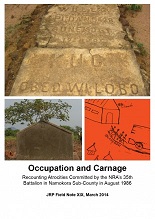
There was an air of excitement in Pagoro Kal village on Wednesday. On this sunny afternoon in Lamogi sub-county, Amuru District, community members were rushing to put final touches to welcome one of their sons home. Richard was abducted by the LRA in September 1996 when he was about 10 years old his uncle, Mr Latim, told us. Since then, his had parents died and his remaining relatives had heard no news about him.
It was a big surprise, then, when his uncle received a phone call telling him that his nephew had returned from captivity in the Central African Republic. After meeting his uncle at at the Army Barracks in Gulu, it was decided that an Acholi traditional ceremony known as nyono tong gweno (‘stepping on the egg’) would be performed at Richard’s ancestral home to cleanse him of any evil spirits that he may have encountered during his time away from home.
On the day of the ceremony, the atmosphere was one of a celebration. About 200 people were in attendance, including Richard’s relatives, community members, as well as representatives of the Ugandan army and a few NGOs. People danced to music blaring from a speaker system and a popular local musician, Tam Noffy, performed songs about the value of human rights, forgiveness and the beginning a new life.
Richard’s arrival, though, was an event in of itself. Around 2pm, the excitement reached tipping point when a convoy of vehicles was spotted heading towards the home of his family. There was a flurry of ululation and cries of “latin wa!” (“our child”) as everyone rushed to see Richard. As people gathered around the vehicle, community elders placed a symbolic stick and egg at the entrance to the home, and when Richard exited the vehicle he was given guidance on what procedure he should follow in order to comply with Acholi tradition. After this he was lifted onto the shoulders of the eager crowd and taken to the front of a tent where his hand was shaken by people excited to meet him. Watching Richard’s heroic welcome home was an incredible experience for the three members of the JRP team that attended, as this was the first time to witness this particular ceremony for them.
JRP has done numerous studies examining such rituals and the impact they have. In Roco Wat I Acoli, the adaptation of traditional cleansing rituals for returnees were examined. In Denis’s story, we documented the experience of a young man who went through a ceremony to appease the spirits of the 27 people he killed while in captivity. Also, in Gender and Generation in Acholi Traditional Justice Mechanisms, we documented attitudes of women and youth towards traditional ceremonies. Each of these studies suggest the therapeutic value of them and the marked improvements in the behaviour and attitudes of the people that participate in them. But while the ceremonies have value, these reports also found that their success is not always straightforward. For instance, where participants understand the significance of the ceremonies, a positive change was generally seen, but where they didn’t there was significantly less likelihood of positive change. So while Richard’s community was very welcoming at this initial stage in his return, the complexity of reintegration of the formerly-abducted, former combatants and others like him remains an integral issue.






